Australians connect and learn through AICC May CyberSecurity delegation to Israel, led by David Irvine AO (sponsored by ECU and supported by Cisco)
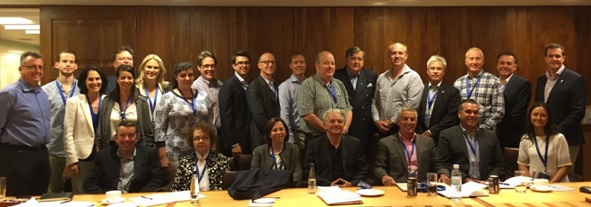 The AICC Cyber Security Trade Delegation to Israel was hosted from 18 to 24 May, 2016. The delegation was led by Mr David Irvine AO, Chair ACSRI (Australian Cyber Security Research Institute), and Professor Craig Valli, Director Security Research Institute, Edith Cowan University, Western Australia.
The AICC Cyber Security Trade Delegation to Israel was hosted from 18 to 24 May, 2016. The delegation was led by Mr David Irvine AO, Chair ACSRI (Australian Cyber Security Research Institute), and Professor Craig Valli, Director Security Research Institute, Edith Cowan University, Western Australia.
The objective of the Security Delegation was to explore the forefront of the world’s leading security systems and technology and highlight the Start-Up business ecosystem that underpins it. Further, to investigate Israel’s fast growing cyber security industry and the country’s overall fostering of innovation, entrepreneurialism, commercialisation and learn how the science and educational sectors interact with industry including its investment in skill sets for future growth industries.
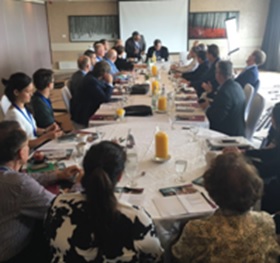 Delegates were able to derive outcomes on three levels;
Delegates were able to derive outcomes on three levels;
- At a corporate level, through customised business meetings leading to new business development opportunities and collaboration with Israeli counterparts;
- At a delegation level, facilitating discussion and identification of opportunity for Australia to potentially adopt some of the policies and practices that deliver economic growth; and
- At a personal level, to experience a remarkable and world leading national case study in business development and cultural transformation.
The delegation was comprised of 28 participants, an eclectic group including ICT and security professionals, academic, government and business representatives, and investors. Through the ability to offer diverse perspectives, the delegation was able to explore how the evolvement of the cyber security industry will impact Australia’s continued geopolitical and economic development. For example, the joint participation of Cisco, Woodside, and ECU, Curtin and Deakin Universities provided a forum to consider new collaborative research.
Amongst many highlights of the delegation, the program included a visit to the Cisco R&D Centre in Netanya, an address by venture capitalist Jon Medved, founder and CEO of OurCrowd, a presentation by Yaakov Amidror, former major general and National Security Advisor of Israel, and a visit to the Cyberspark industrial park in BeerSheva which is the central coordinating body for joint cyberindustry activities with government agencies, the IDF, the public and academia.

“From L to R – Dr. Isaac Shariv, National Chairman, Israel-Australia Chamber of Commerce, Professor Craig Valli, Director, ECU Security Research Institute, Edith Cowan University, Director, ACSRI – Australian Cyber Security Research Institute and Director, Australian Computer Society Centre of Expertise in Security, Mr David Irvine AO, Chair, ACSRI -Australian Cyber Security Research Institute, former Director-General, ASIO- Australian Security Intelligence Organisation & former Director-General, ASIS -Australian Intelligence Service, His Excellency Mr Dave Sharma, Australian Ambassador to Israel, Department of Foreign Affairs and Trade, Mr Gary Hale, Director, Cyber Security & Speciality Projects, Cisco Systems Australia Pty Limited, Mr Paul Israel, Executive Director, Israel-Australia Chamber of Commerce and Mr John Cluer, Chief Executive, AICC-Australia Israel Chamber of Commerce (WA)”
The delegation met both individually and collectively with a large number of start-up companies and potential business partners, as well as being hosted through a number of receptions.
Key emerging themes were prevalent within the program. Most notable were;
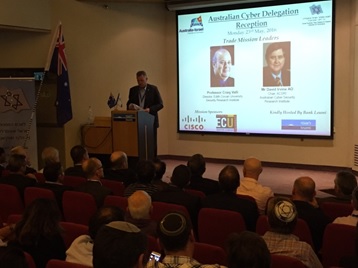 Resilience against cyber-security threats are best combated by collaborative efforts between the public sector (Government and academia) and the private sector (professional entities and investors).
Resilience against cyber-security threats are best combated by collaborative efforts between the public sector (Government and academia) and the private sector (professional entities and investors).- Traditional approaches to cyber security risk have been responsive and based on containment. The recognition that it is impossible to remove risk from every eventuality is mitigated by proactive and predictive activity. Much of the emerging technology and innovation development is in this framed in this context.
- The key to Israel’s cyber security success starts within the secondary education system, and progresses through to national service. Army graduates are equipped with the technical knowledge, discipline, maturity and interpersonal relationships that are then channelled into the business market.
- The ability to make quick decisions in a pressured environment is part of the culture of Israel and is reflected within the cyber security industry, driven by the mantra that “necessity is the mother of innovation”.
- Data, analytics, and knowledge are core products which are becoming increasingly important. The vulnerability of networks is more than a matter of economic dependence, but also a matter of national security. Regulation to protect and secure information is critical, however regulation that inhibits the development and deployment of network infrastructure can be counterproductive.
- The IoT (Internet of Things), encompassing wearable and mobile technology, and state of the art connectivity of infrastructure is rapidly developing in Israel. This futuristic industry is still in an embryonic state, but the new industry development that results will be a major source of economic growth for technology driven economies within diverse sectors such as medical lifescience, agritech, watertech, cleantech and transport.
- The demand for talent is a key driver of the Israel cyber security industry. Recruitment processes are non-traditional and give greater regard to the team culture and collaborative abilities of candidates than their educational record. In the words of one CEO “we look at what they can do, not what they have done”.
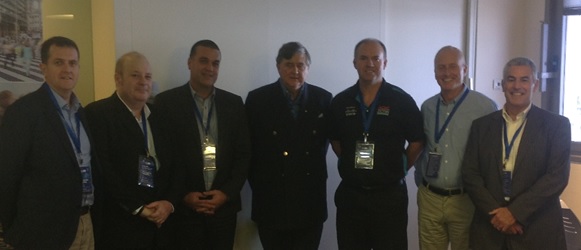
“From L to R – Mr Brian Smith, Chief Information Security Officer, Woodside Energy Ltd, Professor Craig Valli, Director, ECU Security Research Institute, Edith Cowan University, Director, ACSRI – Australian Cyber Security Research Institute and Director, Australian Computer Society Centre of Expertise in Security, Mr Paul Nicholls, Director Strategic Projects (R&D), Curtin University, Mr David Irvine AO, Chair, ACSRI -Australian Cyber Security Research Institute, former Director-General, ASIO- Australian Security Intelligence Organisation & former Director-General, ASIS -Australian Intelligence Service, Mr Gary Hale, Director, Cyber Security & Speciality Projects, Cisco Systems Australia Pty Limited, Mr Michael Trovato, Managing Partner, Cyber Risk Advisors and Mr John Cluer, Chief Executive, AICC(WA)”
There is much that Australia can model and learn from through the Israeli experience, however it was noted that many of the elements that have led to Israel’s success are not prevalent in Australia. Delegates commented that the notion of national service, not necessarily under a military structure, is a potential area of thought leadership for Australia to consider. The educational system and a focus on STEM capabilities is also a critical area of focus.
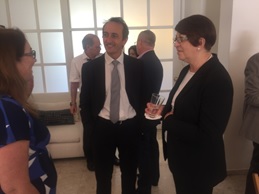
“His Excellency Mr Dave Sharma, Australian Ambassador to Israel, Department of Foreign Affairs and Trade and Ms Ricky Burges, Chief Executive Officer, WALGA – The WA Local Government Association, Western Australia”
Individual delegates have pursued private business outcomes through their delegation participation. Specific arrangements for investment, supply, consultancy and collaboration have been identified and will further develop.
At a key time in Australia’s economic development, and with the National Science and Innovation (NISA) agenda being a strategic priority of the incumbent Government, it was timely for this AICC Delegation to gain an in-depth exposure the contemporary developments within the global cyber security markets. It was also timely for delegates to obtain a first-hand appreciation of the business eco-system that allows Israel to accelerate new business development and deliver broader economic benefits.





